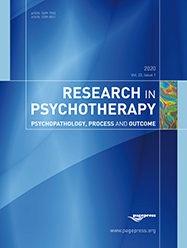Effectiveness of Jungian psychotherapy in supervised training settings
All claims expressed in this article are solely those of the authors and do not necessarily represent those of their affiliated organizations, or those of the publisher, the editors and the reviewers. Any product that may be evaluated in this article or claim that may be made by its manufacturer is not guaranteed or endorsed by the publisher.
Authors
Jungian psychotherapy (JP) is an established treatment modality in modern healthcare systems, yet empirical validation remains a key requirement for its continued recognition and insurance coverage. This study aimed to assess the effectiveness of JP by evaluating pre- and post-treatment changes in psychological symptoms, personality structure, and quality of life among 104 participants undergoing supervised therapy at a German training institute. Using a pre-post design, participants completed standardized psychometric assessments, including the International Classification of Diseases – 10th Revision (ICD-10) Symptom Rating (ISR), the Fragebogen zur Lebenszufriedenheit (FLZ; Life Satisfaction Questionnaire), and the Operationalized Psychodynamic Diagnosis - Structure Questionnaire (OPD-SQ), before and after therapy. Results from paired samples t-tests and Wilcoxon signed-rank tests indicated significant improvements across multiple domains. Participants experienced notable reductions in symptom burden, particularly in depression, anxiety, and obsessive-compulsive symptoms, with effect sizes ranging from moderate to large (d=0.555 to d=1.174). Improvements were also observed in self-perception, interpersonal contact, and relational experiences. However, eating disorder symptoms did not show significant improvement (p=.275), likely due to the need for specialized interventions. Future research should employ randomized controlled trials (RCTs) and long-term follow-ups to establish the durability of treatment effects.
Department of Psychology, University of Basel, Switzerland; C.G. Jung-Institut Stuttgart, Germany; International Network for Research and Development in Analytical Psychology (INFAP3), Germany.
International Network for Research and Development in Analytical Psychology (INFAP3), Germany.
International Network for Research and Development in Analytical Psychology (INFAP3), Germany.
How to Cite

This work is licensed under a Creative Commons Attribution-NonCommercial 4.0 International License.






